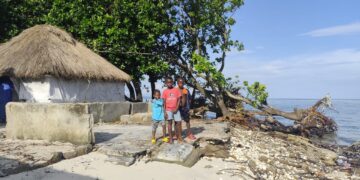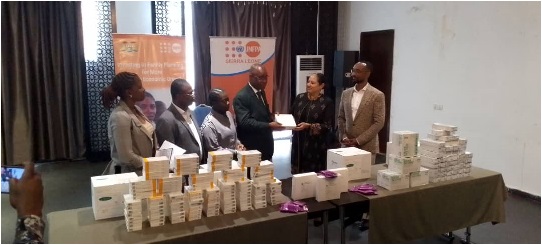By Alieu Amara Suwu
Observing World Contraceptive Day with the objective to raise public awareness about the critical importance of contraception in empowering women and girls, reducing adolescent pregnancies, and improving maternal health in Sierra Leone, Nadia Rasheed, UNFPA Country Representative, has said her institution has given $1.1 maternal health medicines to the Ministry of Health, which brings the total value of reproductive health commodities supplied this year to over $2 million, providing protection to an estimated 755,000 couples for a period of one year.
Observing the day on 26 September at the Atlantic Hotel at Lumley, Freetown, she explained that access to contraception is a cornerstone of gender equality and a driver of economic growth; therein, when women and couples plan their families, women and girls and young people are more likely to remain healthy, stay in school, join the workforce, and contribute to human capital development. She maintained that these benefits transform communities and society and fuel development progress.

Madam Rasheed commended the government for its steadfast efforts and the progress made in increasing access to family planning information and services, while revealing that, in 2023, 640,000 women were using modern contraceptives in Sierra Leone, which has helped to prevent an estimated 240,000 unintended pregnancies, 87,000 unsafe abortions, and 770 maternal deaths.
In the past five years, she further revealed that UNFPA, through their global supply partnership, has procured and delivered nearly $14 million worth of contraceptive supplies to Sierra Leone, which have helped to cover about 90% of public sector needs.
She said, despite the progress made, the unmet need for contraception remains high, particularly among adolescent girls. She noted that addressing myths, misconceptions, and harmful social norms is therefore essential to ensuring that family planning commodities are reaching the adolescents and women who need them most.
Dr. Senessie, Deputy Minister of Health, reaffirmed the support UNFPA has rendered to the government to ensure that Sierra Leoneans have access to contraceptives and have knowledge of how to use them. He, however, talked about how funds are hard to come by, but with the help of partners, such as UNFPA, they have been able to mitigate the gap in the supply chain.
He said, as a ministry, they have developed laws and strategies with regards to safe maternal health.
Rosaline Judy, Youth and Adolescent Advocate, explained how they have gone into communities talking about the importance of contraception and about barriers, norms, religious beliefs, and taboos that are associated with family planning.
Noting the challenges, she said they deserve to have a choice and live in a society that respects their lives, saying that, as young people, they are willing to work and to see that they have the opportunity and succeed as they celebrate Contraceptive Day.
She commended the efforts of the government in terms of signing the MP 2030 commitment and advocated for a better legal framework and its enforcement.
She committed to working with the government and partners in the area of maternal health and family planning.
In attendance were experts in reproductive health care and staff of UNFPA, such as Gamachis Shogob, who is the technical expert in reproductive health commodity security.
World Contraceptive Day is observed annually on September 26 to raise awareness about the importance of access to safe and effective contraception. Contraceptives include pills, implants, intrauterine devices, surgical procedures, condoms, and other methods that help to prevent unintended pregnancy.

























